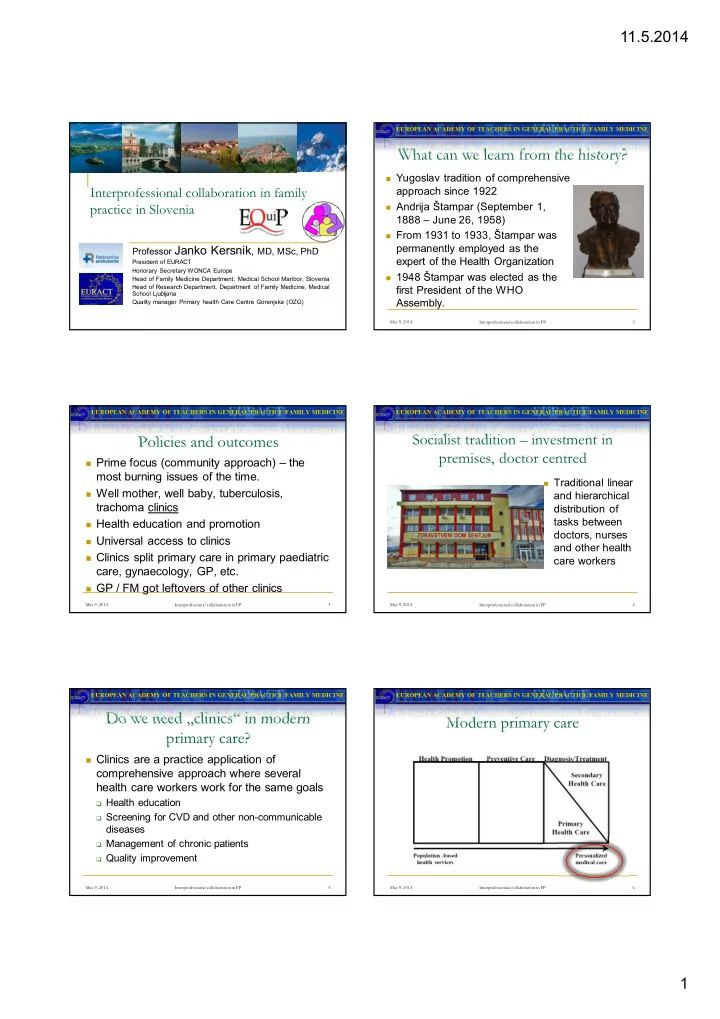

11.5.2014 What can we learn from the history? Yugoslav tradition of comprehensive Interprofessional collaboration in family approach since 1922 Andrija Štampar (September 1, practice in Slovenia 1888 – June 26, 1958) From 1931 to 1933, Štampar was permanently employed as the Professor Janko Kersnik , MD, MSc, PhD expert of the Health Organization President of EURACT Honorary Secretary WONCA Europe 1948 Štampar was elected as the Head of Family Medicine Department, Medical School Maribor, Slovenia Head of Research Department, Department of Family Medicine, Medical first President of the WHO School Ljubljana Assembly. Quality manager Primary health Care Centre Gorenjska (OZG) May 9, 2014 2 Interprofessional collaboration in FP Socialist tradition – investment in Policies and outcomes premises, doctor centred Prime focus (community approach) – the most burning issues of the time. Traditional linear Well mother, well baby, tuberculosis, and hierarchical trachoma clinics distribution of tasks between Health education and promotion doctors, nurses Universal access to clinics and other health Clinics split primary care in primary paediatric care workers care, gynaecology, GP, etc. GP / FM got leftovers of other clinics May 9, 2014 Interprofessional collaboration in FP 3 May 9, 2014 Interprofessional collaboration in FP 4 Do we need „clinics“ in modern Modern primary care primary care? Clinics are a practice application of comprehensive approach where several health care workers work for the same goals Health education Screening for CVD and other non-communicable diseases Management of chronic patients Quality improvement May 9, 2014 Interprofessional collaboration in FP 5 May 9, 2014 Interprofessional collaboration in FP 6 1
11.5.2014 How to use competences effectively Competences of a GP / FM To use comprehensive To be orientated towards approach community 1. To manage complaints in primary care To manage ... both acute to reconcile the health 2. To be person centred in delivering care and chronic health needs of individual problems… patients and the health 3. To apply specific problem solving skills needs of the community To promote … by in which they live in applying health promotion 4. To use comprehensive approach balance with available and disease prevention… resources To manage and co- 5. To be orientated towards community ordinate health promotion, prevention, 6. To use holistic modelling cure, care… May 9, 2014 7 May 9, 2014 8 Interprofessional collaboration in FP Interprofessional collaboration in FP Translated into every day practice Needs of the community Actions needed Unhealthy lifestyle Health promotion Undetected risk Screening for risk factors for non- factors for chronic communicable non-communicable diseases diseases NEW MODELS OF PRIMARY Rising numbers of Chronic disease patients with chronic management CARE WANTED diseases May 9, 2014 Interprofessional collaboration in FP 9 May 9, 2014 Interprofessional collaboration in FP 10 Comprehensive approach – „clinic“ in Clinics in primary care in Western countries family practice UK tradition In 2011 a project on so called model family To cope with growing medicine practices has been introduced by numbers of patients in Ministry of health by support of all stakeholders in chronic care health care field and chaired by Ass. Prof Tonka Introducing nurse Poplas Susic, this year awarded WONCA Europe 5* doctor. practitioners as independent Each family medicine model practice’s team practitioner consists of 1.0 FTE family physician, 1.0 FTE practice nurse and 0.5 FTE nurse practitioner with baccalaureate degree. May 9, 2014 Interprofessional collaboration in FP 11 May 9, 2014 Interprofessional collaboration in FP 12 2
11.5.2014 NPs’ activities NPs’ activities routine management of patients with stable screening for and counselling on chronic diseases: Cardiovascular risk factors, COPD Diabetes Asthma Depression Hypertension COPD Diabetes Hypertension Osteoporosis … Depression Smoking and BHP Management of smoking and risky alcohol drinking May 9, 2014 13 May 9, 2014 14 Interprofessional collaboration in FP Interprofessional collaboration in FP Practices enrolled By the end of the year 2012 there were 217 practices enrolled, each year 84 new ones enrolled covering 506.053 patients, almost a quarter of the whole population. FIRST RESULTS Political support Media coverage October 24th, 2013 FM Conference Ukraine 15 October 24th, 2013 FM Conference Ukraine 16 Screening results Disease registers 31,800 „new“ patients By the end of 2012 with cardiovascular risk there were factors were detected 11,018 asthma patients, only 11,954 patients 5,863 COPD patients ended on the list of and patients without any 23,409 diabetes detectable risk factor patients registered and due to be screened again in five years. May 9, 2014 Interprofessional collaboration in FP 17 May 9, 2014 Interprofessional collaboration in FP 18 3
11.5.2014 Why do we need interprofessional Challenge – shift in „thinking“ clinical practice? Teamwork To assure and improve mutual respect Collaboration on a national level To share knowledge, skills and attitudes Interprofessional collaborative practice To enable shared decision-making Quality assessment To guarantee accountability Additional training modules (organisation of the practice, prevention and management of asthma, That makes better work environment COPD, diabetes and hypertension…) for FDs and and NPs were launched. Assures delivery of good (improved) patient care May 9, 2014 19 May 9, 2014 20 Interprofessional collaboration in FP Interprofessional collaboration in FP Conclusions We do not and should not re-invent the wheel Thank you for your attention! It is never to late to (re)start good practices There is plenty of work to be done out there The problems of the community are what matters We have to work together for common goals Strong professional will, interprofessional collaboration and political support are needed Public is important alliance May 9, 2014 Interprofessional collaboration in FP 21 4
Recommend
More recommend